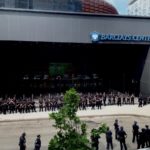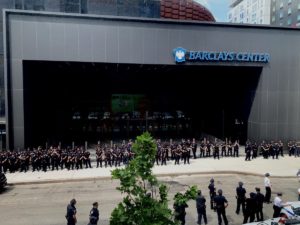In Honor of George Floyd – Thoughts in the Aftermath of the Brooklyn Protest


A few scattered, partial thoughts on tonight’s rally in Brooklyn and the overall political moment….
- The turn out was incredible, easily around 10,000 people on less than 24 hours notice. Very multi-racial, mostly young and lots of people with homemade signs and unaffiliated to any kind of political organization or group. It seems like for many of the people I talked to this wasn’t there first protest. It’s clear that there is a new generation of people who have become politicized in the era of Trump, Black Lives Matter, the Women’s Marches, Climate Strikes, and for whom the idea that people need to take to the streets – protest, demonstrate, shut things down, sit-in etc. – to accomplish any kind of meaningful change is common sense. The question of how to concretely begin organizing and moving in that direction, people are not clear on.
- The sense of visceral rage and pent up class anger was palpable. People yelled and screamed at the police, throwing things. I saw young Black men yelling in outrage over friends and family members who’ve been incarcerated or brutalized. Later in the night protests surrounded a police precinct in a predominantly black neighborhood and burned a police van. At one point, residents were coming out of the housing projects and joining the demonstration. There was a very raw sense that for a lot of people, this wasn’t just some “abstract” issue, but a question of brutality and violence that they face in their day to day lives. The police in New York, especially in working class Black and Brown neighborhoods, have come to symbolize the sharpest and most brutal edge of an entire edifice of poverty, oppression and governmental abandonment that is rotten to its core.
- I think it’s very clear that we have entered a new moment in American politics. The landscape is extremely volatile and polarized; working class uprisings against racism and police killings on the one hand, armed demonstrations of fascists and the petit-bourgeoisie to force open the economy for capital on the other. These recent actions are not simply protests. What’s unfolding in Minneapolis and has now spread to cities across the country can only be described as a rebellion, spearheaded by Black workers and youth and on a scale and magnitude potentially even larger than what we saw in Ferguson or Baltimore. This is a collective uprising, catalyzed by yet another police murder, but in response to something much deeper; a cataclysmic failure of the system to offer even the most basic standard of living or sense of dignity to the working class—Black and white. The coronavirus pandemic has only exacerbated the economic devastation in urban Black communities. Decades of government neglect and financial disinvestment, extreme poverty, depression levels of unemployment, hyper segregation, all backed up and enforced by a brutal militarized police state that has been able to terrorize and murder Black people with complete and total impunity-these are the ingredients of the unfolding rebellion in Black America.
- I don’t think it can be underscored enough–the Black liberation struggle is once again ripping open the pandora’s box of American capitalism. This rebellion is exposing the brutal, sick and twisted priorities of American capitalism to the entire world. The hideous underbelly of American racism is being laid bare. Far from “distracting” from the “real” economic issues and demands of the working class, the Black struggle is highlighting the centrality of racism and Black oppression as the lynchpin that holds American capitalism together. The unfolding rebellion has the potential to serve as an entryway to the entire working class into a larger struggle for social transformation and the possibility to put forward an alternative vision of multi-racial working class solidarity as opposed to the bankrupt politics on offer from both parties of American capital.
- Our side has to get more organized, period. Outbursts of spontaneous anger will only get the struggle so far. From the front of the rally today, there was no clear political leadership or organizational direction put forward. Instead, people rallied and stood around while the police penned us in and then ultimately separated and hunted us down, using brutal levels of force. Tear gas, pepper spray, rubber bullets. At one point, they used riot shields and bicycles to smash people onto the sidewalks, arresting anyone who came in their way; mothers, teenagers, young women, the elderly. If people have to worry about being vulnerable to that level of violence and repression any time they come to a protest, that’s a problem. Our power is in our numbers. Imagine, if instead of getting caught up in isolated and reckless games of cat and mouse with the cops, ten thousand people took over the streets and shut down the Brooklyn Bridge or occupied the police precinct. Or if all of the demonstrations across the city converged in one unified action. We need democratically organized, centrally coordinated and disciplined mass actions of militant direct action and social disruption that are welcoming and inviting to new people, including those who can’t get arrested—the undocumented, formerly incarcerated, parents with childcare responsibilities etc. The police are only going to get more organized and repressive, we have to prepare and account for that by taking steps on our side to become more organized and take seriously the defense of our movement. The refusal of the Transit Workers Union to transport police and those who’ve been arrested gives a small glimpse into the power of the organized working class. We have to begin thinking about how we can expand and build on that.
- Some thoughts on the participation of the Democratic Socialists of America (“DSA”) in the action. I say this as someone who is new to DSA, but not new to the socialist movement, as someone who only wants to see the socialist movement grow and become a more rooted and influential force in working class life and politics. I offer these suggestions in the spirit of solidarity and debate. DSA’s orientation to the rallies in New York were completely insufficient. Yes, at the local and national level the organization put out some solid statements and promoted actions on their social media, but that can not operate as a substitute to a real, substantive organizational and political orientation. There was no organized, visible DSA contingent or presence. There was no effort to think through: how are we trying to project and build DSA as an independent force? How are we trying to organize, sustain and deepen the movement? What are the concrete next steps that need to come from this to advance the struggle to the next level? DSA is the largest socialist organization in the country. It is a disservice not only to DSA and the socialist movement, but to the struggle for Black liberation and the continuation of this new movement to not begin seriously thinking through the organization’s role in this process. It’s a major problem, in my opinion, that the only organized forces from DSA that I saw at the rally were from the Afro Socialist Caucus. Our Black comrades should not be forced to shoulder this responsibility on their own. People may disagree, but I think DSA is overly oriented on electoral campaigns to the detriment of on-the-ground social movement organizing. The uprising in Minneapolis and the trajectory of this newly emerging movement has far more importance than the outcome of the upcoming primaries or the presidential election. I hope this a wake-up call to comrades and our organization; there needs be a hard reorientation towards social movement organizing, specifically anti-racist struggles, and thinking through how we can begin to fuse and integrate this with other areas of work.